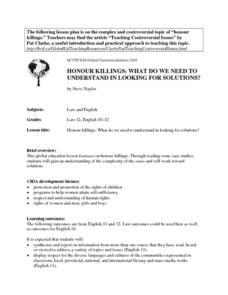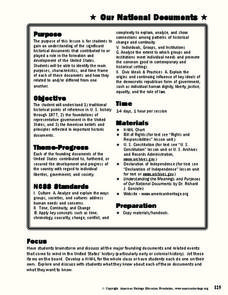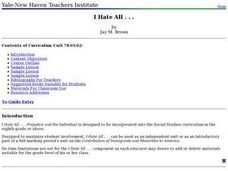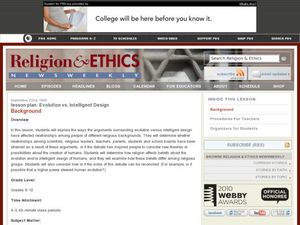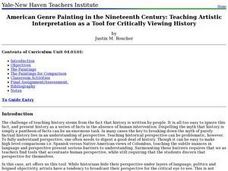Curated OER
Assessing Freedom of Religion or Belief in Your Community
Students examine the issue of the freedom of religion or beliefs in their family and community. As a class, they state the difference between a plural and homogenous community and identify the difference between major religious groups...
Curated OER
Honour killings: What do we need to understand in looking for solutions?
Students prepare a chart with four columns: things we know, things we think we know but need to check, things we wonder about, and new things we have learned. Each group is given a case study and they discuss the three cases of "honor...
Curated OER
Running Rings Around the Competition
students explore the debate behind Beijing's bid to host the 2008 Olympics from the perspectives of different groups involved. They then 'cast votes' as members of the International Olympic Committee as to which city should be chosen.
Curated OER
Geneticist for a Day
Students discuss and compose a document discussing the transmission of the Huntington's gene- dominant or recessive, sex linked, etc. Additionally, they ought to consider Dr. Wexler's own odds for contracting the disease.
Curated OER
The Right Tool for the Job: Diagnosis Spectrum
Students watch a section of a medical TV show and individually make a written recommendation of appropriate imaging techniques to be used and explain why they chose these techniques. They participate in a discussion revealing their...
Curated OER
Global Warming Is Human Made
In this environmental awareness worksheet, students read an article about the causes of global warming. Students then answer seven true or false questions, 10 10 synonym matching questions, and ten phrase matching questions based on the...
Curated OER
The Secreat to Good Health: Eating Right and Exercise
Students create a seven-day record of all the foods they consume. They analyze what type of food was the most frequent in everyone's diet. They look up each food and record its daily recommended amount.
Curated OER
Our National Documents
Students consider the significance of selected American documents. In this civics lesson, students analyze excerpts of the Declaration of Independence, the U.S. Constitution, and the Bill of Rights.
Curated OER
Number Lines
Third graders create a human number line. In this number lines lesson plan, 3rd graders review how to create a number line and its purpose. Students form a human number line by drawing a number from a bag and positioning themselves on a...
Curated OER
Blue Genes: Affect Your Life!
Students, in groups, research, analyze and synthesize information on genetic diseases. After watching a video on genetics, groups perform research on a variety of genetic diseases and present their findings to the class.
Curated OER
Replicating Controversy
Student act as a research scientists and investigate the development of animal and human cloning. They then report their findings, both orally and visually, to their "colleagues" at a symposium on cloning research. Students explore the...
Curated OER
Holocaust Vocabulary Quiz
In this Holocaust vocabulary activity, students match vocabulary words to the left with their definitions to the right. Worksheet contains links to additional activities.
Curated OER
I Hate All . . .
Students examine the concept of prejudice of human beings towards other human beings. They define prejudice and analyze the history of the word, read a U.N. Commission Report on prejudice, and examine textbooks for prejudice.
Curated OER
The 1970s in America
In this 1970s worksheet, 9th graders answer ten questions with a word or phrase, decide which event (in three different pairs) occurred first, then link two groups of words together by writing what they share in common.
Curated OER
Evolution vs. Intelligent Design
Ninth graders explore the arguments surrounding evolution versus intelligent design have affected relationships among people of different religious backgrounds. In this ethics lesson plan, 9th graders determine whether relationships...
Curated OER
Biomes -- Part 1
Students use the internet to locate and gather information on the world's biomes. They compare and contrast biomes to ecosystems and describe the human effects on ecosystems. They answer questions to end the lesson.
National First Ladies' Library
Executive Order 9066: Japanese-American Internment
Pupils analyze conditions under which sections of United States Constitution are superceded, research history of Native Americans, African Americans, and Japanese Americans, and debate policy of reparations for various minority groups in...
Curated OER
Lesson 2: The Story of Flagstaff
Students, in groups, write and perform a skit that retells the story of the flooding of Flagstaff.
Curated OER
Parts of a Computer
Students, after identifying the parts of a computer, and categorizing the parts by functions (input, output, process, and storage), explore how all the parts of a computer work together. They compare/contrast the differences between...
Curated OER
Motion, Force, and Gravity
Learners write a research paper about human space travel. In this space travel lesson, students watch a video and research issues related to space travel. They use their research to write a paper about whether human space travel should...
Curated OER
American Genre Painting in the Nineteenth Century: Teaching Artistic Interpretation as a Tool for Critically Viewing History
Students view a variety of artwork to determine the history and lifestyle of people from New Haven, Connecticut. In groups, they develop their individual hypothesis about why the paintings were created and share them with their group...
Curated OER
Special Report: Flood of the Great River
Students work together in groups and role play the role of television crews. Using the internet, they research specific events of the Mississippi River flooding and report their findings to the class from different angles. They are to...
Curated OER
Introductory Lesson For the Beginning of Each New Year
Learners explore the five values of truth, love, peace, righteousness, and non-violence. Students read a story and a poem, sing songs, and participate in hands-on activities to investigate and reinforce values. In groups, learners act...
Curated OER
Due Process of Law and the Jim Crow Era
High schoolers analyze eight case studies of Supreme Court decisions regarding due process of law and their impact on American society in the early 20th century. They digest that although the 14th amendment was intended to give federal...



